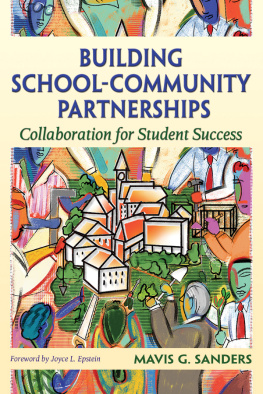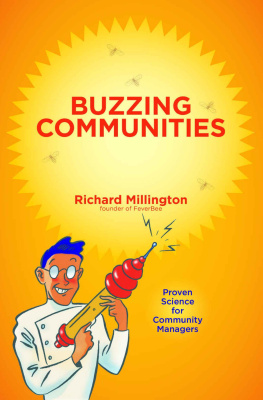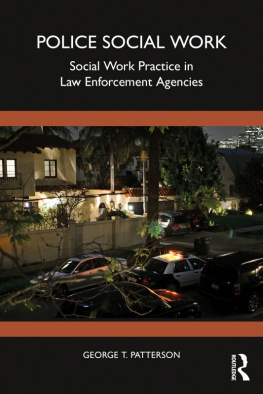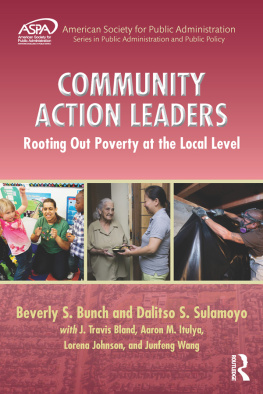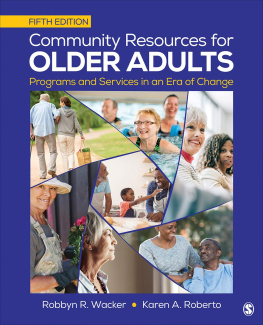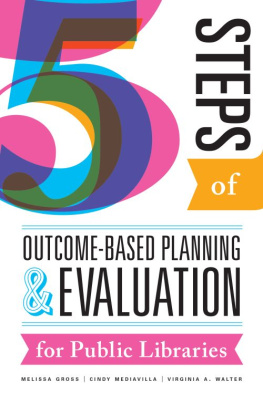Collaborating with Community-Based Organizations Through Consultation and Technical Assistance
Collaborating with Community-Based Organizations Through Consultation and Technical Assistance
Edited by
Patricia Stone Motes and Peg McCartt Hess
Columbia University Press New York
Columbia University Press
Publishers Since 1893
New York Chichester, West Sussex
cup.columbia.edu
Copyright 2007 Columbia University Press
All rights reserved
E-ISBN 978-0-231-50285-6
Library of Congress Cataloging-in-Publication Data
Collaborating with community-based organizations through consultation and technical assistance / edited by Patricia Stone Motes and Peg McCartt Hess.
p. cm.
Includes blibliographical references and index.
ISBN 023112872X (cloth : alk. paper)ISBN 0231502850 (e-book)
1. Community-based family service. 2. Family services. 3. Community organization.
4. Family social work. 5. Community development.
I. Motes, Patricia Stone. II. Hess, Peg McCartt.
HV697.C63 2006
362.8257dc22 2006017593
A Columbia University Press E-book.
CUP would be pleased to hear about your reading experience with this e-book at .
Contents
. Strategic Planning Cycle
. Worksheets for Development of Logic Model
. Evaluation Plan Worksheets
. Data Collection and Analysis Plan Form
. Level of Attainment Forms
. Building Organizational and Community Capacity
. Consultation, Technical Assistance, Service: Examples of Supportive Actions
. Minimal Multicultural Competencies for Practice
We are indebted to a number of colleagues who have invested deeply in this collaborative effort. Arlene Bowers Andrews, former director of the Institute for Families in Society, urged the institutes faculty to conceptualize and write about our collaborations with numerous community-based organizations that serve children and families. Without her vision and her confidence in our work and in us, this volume would not have been undertaken.
As coeditors and contributors, our process in developing this volume was somewhat unusual. Beginning in 2001, we met together regularly to reflect upon and conceptualize our professional work as consultants. As a group, we developed the books focus and organization and subsequently collaboratively reviewed and discussed chapter drafts. The willingness of the contributors to engage in this time-consuming process greatly enhanced both the theoretical and practical basis of the book and its readability. We are indebted to all of our colleagues at the Institute for Families in Society who contributed in both large and small ways to the conceptualization of this book.
Throughout this volume, vignettes and case examples from our practice illustrate the text. We are grateful to the organizations with which our consultation, technical assistance, and collaborative practice occurred for giving permission for these illustrations to be included.
We also consistently received excellent editorial and technical support from Rene Gibson, public information director at IFS. As a member of our collaborative team, Rene brought her multifaceted competencies to bear on the manuscript and assisted in final editing and formatting as well as the design of the volumes graphic illustrations.
At critical decision points throughout the process, we also received invaluable guidance from the social work editorial staff of Columbia University Press: the late John Michel, Shelly Reinhardt, and, most recently, Lauren Dockett. We also recognize the contributions of the anonymous peer reviewers who provided insightful feedback and wise suggestions, thereby improving the final product.
And finally, we are deeply grateful to the countless professional practitioners and community professionals, service consumers, and the staff of funding organizations whose collaborations with us have shaped and informed our knowledge, our skills, and our understanding of what is needed to support and strengthen both communities and families.
Patricia Stone Motes
Peg McCartt Hess
Communities and human service organizations can greatly support and strengthen the lives of families; however, they are often challenged in meeting these important tasks. During the past three decades, several developments have affected how communities and organizations are addressing this challenge. First, there has been a shift of focus from the individual to an ecological perspective, including attention to families, schools, neighborhoods, and other systems affecting individuals. This change in emphasis highlights an increased awareness of the importance of the family and other systems for an individuals development and functioning. The results are reciprocal in that positive influences from families and systems create strong individuals who make up strong families and, consequently, build a strong society.
Many agencies and organizations have implemented innovative family support programs in response, such as after-school programs, respite care, intensive home-based services, and mutual support parenting groups. At the same time, social science researchers began examining the ways in which neighborhoods and communities either support or hinder families efforts to produce healthy individuals. As knowledge about community strengths and challenges has grown, the focus of human services has broadened to include the neighborhoods of the families served. Major governmental and private funders have consistently begun to call for programs to strengthen both communities and the families living in them.
Second, driven by a growing consensus from both private and public funders that community-based programming must be fiscally accountable and deliver positive program outcomes, family-serving organizations and community groups are being challenged to deliver outcomes at a higher standard. These challenges are occurring even as funding for community-based programming is becoming more limited. Thus, not only must programming meet higher standards, but programs must do so within an environment where resources to support families have become more limited.
Such changes have prompted many organizations and community groups to seek consultation, technical assistance, and specialized services from individuals, management-consultant firms, and university units such as institutes and centers. These partnerships offer support in areas such as strategic planning, program development, resource development, and program evaluation to advance the organizations efforts to serve the community and to be responsive to requirements of funders. In some instances, these partnerships provide that avenue for incorporating program development, program evaluation, and other supports into existing organizational infrastructures. However, the capacity to carry out these numerous accountability requirements is often beyond the capabilities of many community-based organizations and programs, and thus partnerships with consultants are often pragmatic choices for organizations and community groups.
This book reflects the experiences of a group of faculty members, researchers, and practitioners affiliated with the Institute for Families in Society, an interdisciplinary unit of the University of South Carolina that seeks to enhance the well-being of families through research, education, consultation, and technical assistance at community, state, national, and international levels. Institute faculty are from fields such as education, sociology, psychology, social work, public health, geography, nursing, law, medicine, womens studies, African American studies, and computer science. They represent a vast array of cultural backgrounds and professional and life experiences. While this book is grounded in research, it is also reflective of the lived experiences of the contributors.


